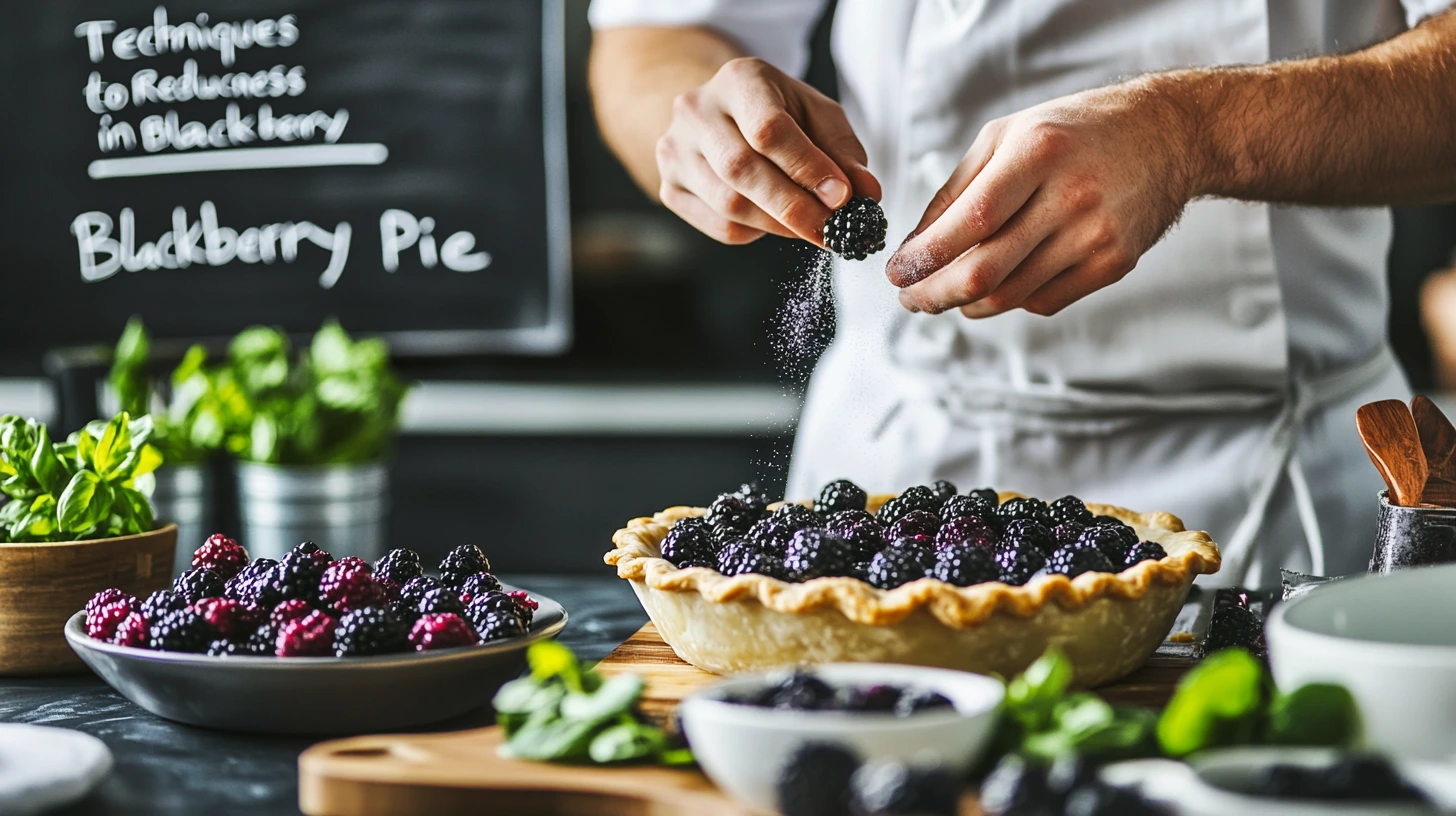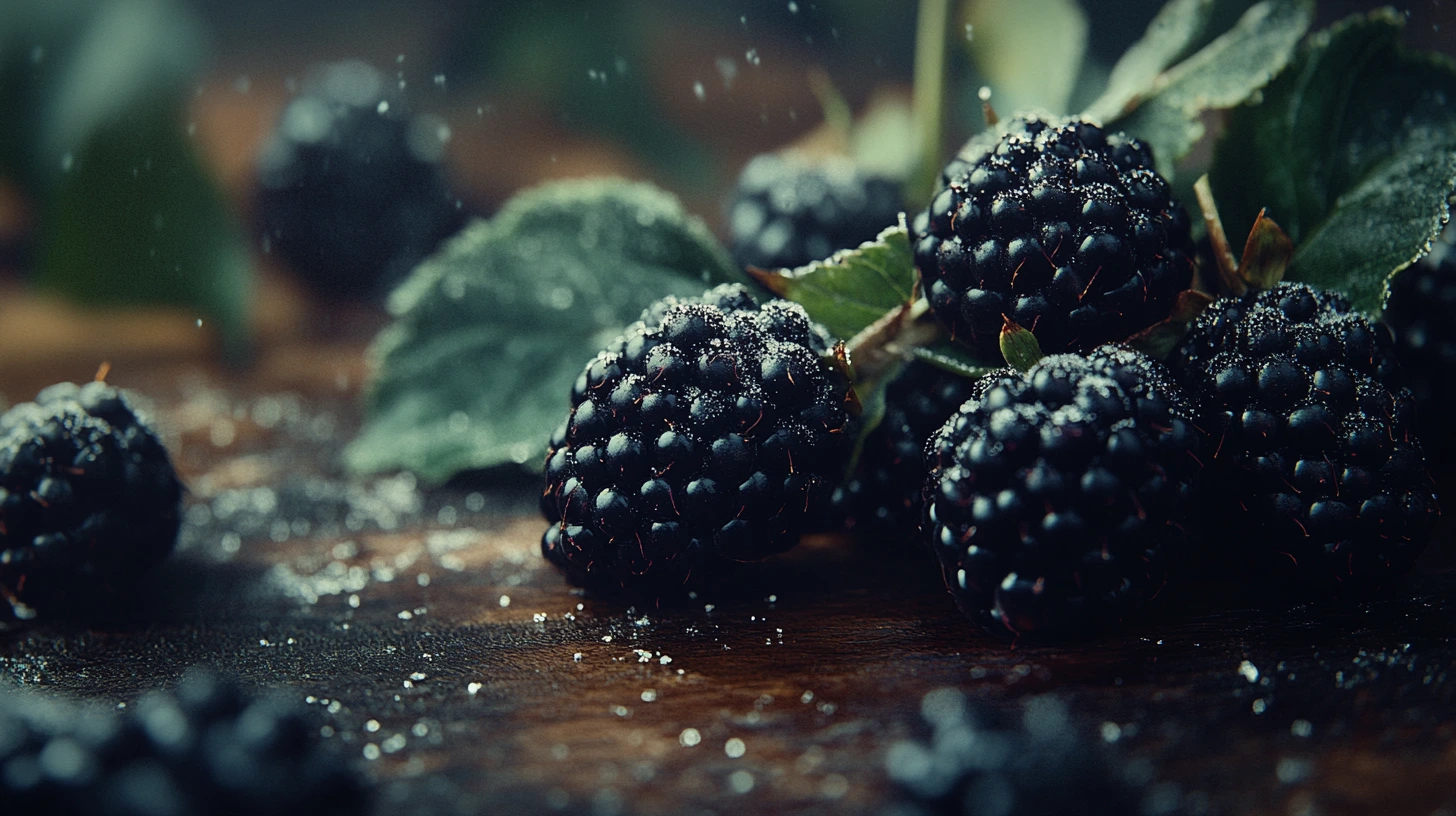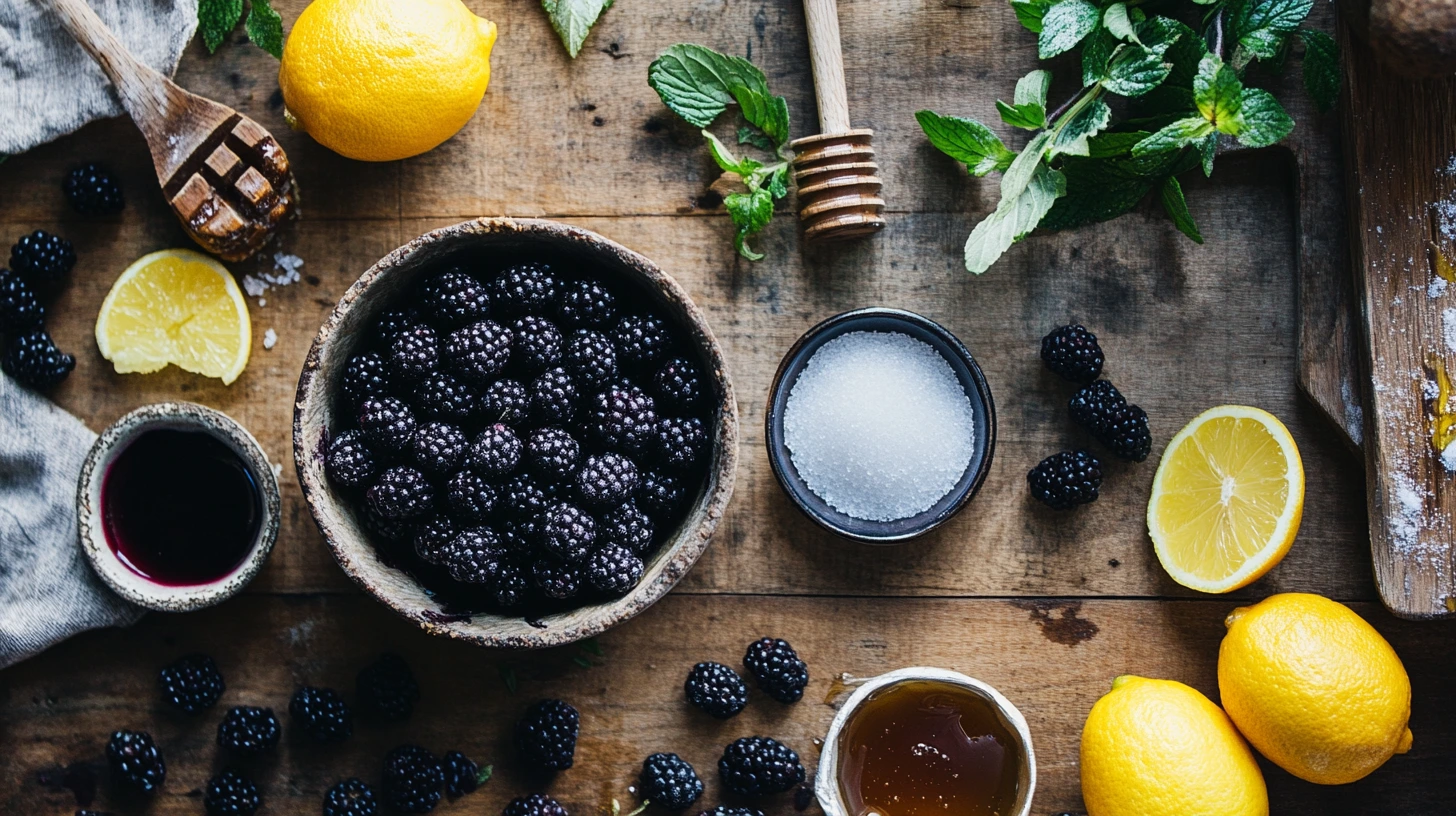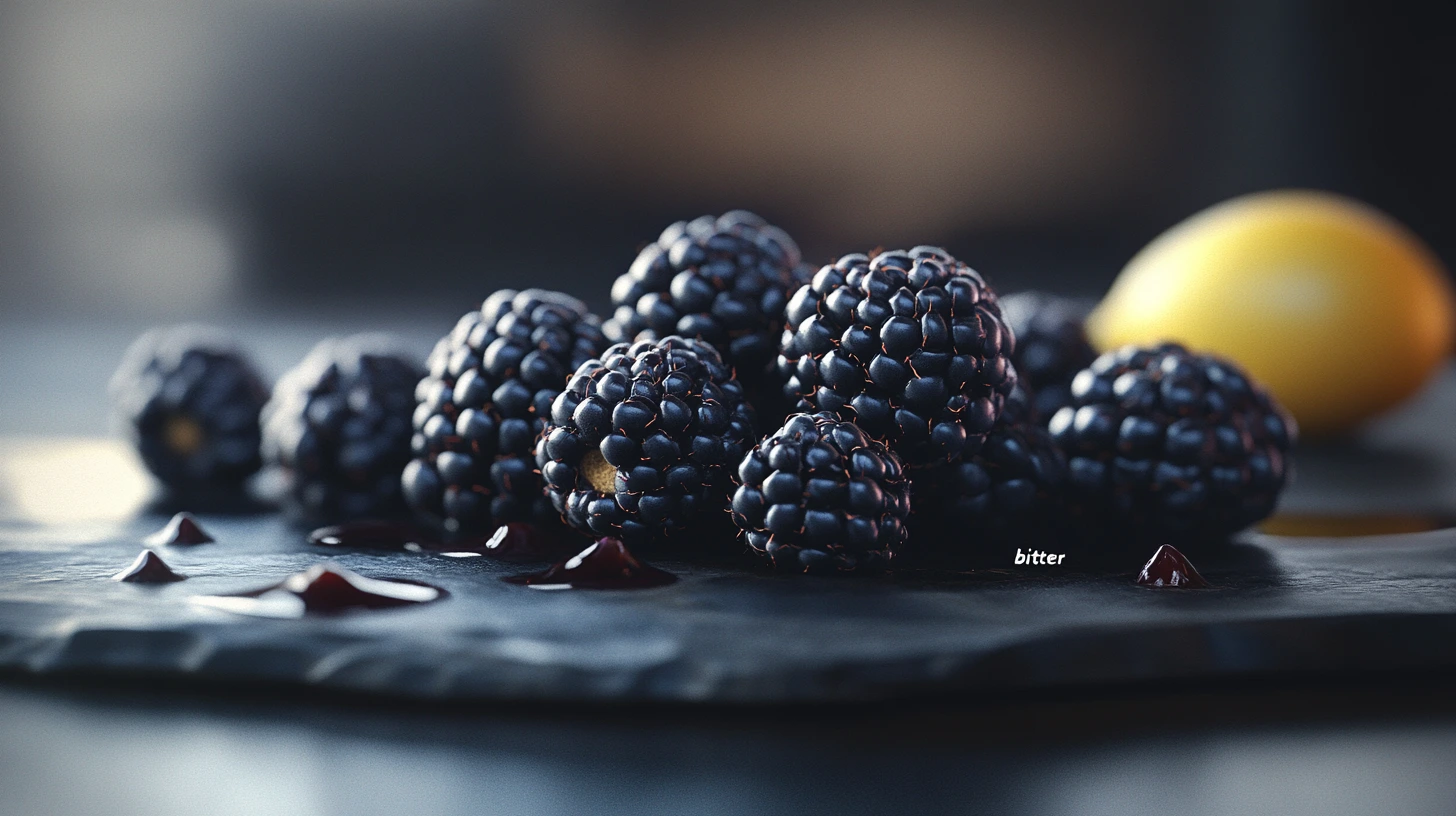Understanding Why is My Blackberry Pie Bitter?

Introduction to Blackberry Pie Bitter
A Classic Dessert Tradition
Blackberry Pie Bitter have long been a cherished dessert, beloved for their sweet and tart flavor profile. The perfect blend of juicy blackberries and a buttery, flaky crust makes this pie a timeless treat. Often served at family gatherings, picnics, and festive occasions, blackberry pies are more than just a dessert—they’re a nostalgic journey to simpler times. Many traditional recipes are passed down through generations, adding a personal touch to every slice.
Popularity of Blackberry Pies Worldwide
Though blackberry pies originated in Western culinary traditions, their appeal transcends borders. They are enjoyed in various forms from North America to Europe and even parts of Asia. Each region adds its twist—whether it’s a hint of spice, a different type of pastry, or locally sourced blackberries. This widespread popularity highlights the universal love for this classic dessert, uniting cultures through its irresistible taste.
The Problem of Bitterness in Blackberry Pies
Common Complaints from Bakers
Bakers face one of the most frequent challenges when making blackberry pies, which is the bitterness that sometimes emerges in the filling. This bitterness can result from underripe berries, improper preparation, or even the variety of blackberries used. Bakers often express frustration when their efforts to create a delicious pie are overshadowed by an unpleasant aftertaste, making the dessert less appealing to family and guests.
How Bitterness Affects the Enjoyment of Pies
Bitterness in blackberry pies can significantly diminish the overall enjoyment of the dessert. A pie that should be sweet, tangy, and satisfying instead leaves a harsh or sour impression, disappointing those eagerly anticipating a classic treat. The bitterness disrupts the balance of flavors, overshadowing the blackberries’ natural sweetness and the crust’s richness. Addressing this issue is essential to preserving a homemade blackberry pie’s comforting and delightful nature.
Causes of Blackberry Pie Bitter
Overripe or Underripe Blackberries
The ripeness of blackberries plays a crucial role in determining the flavor of the pie filling. Overripe blackberries can develop a fermented, overly sour taste, while underripe ones often have a sharp, bitter flavor. Using blackberries at the peak of ripeness is essential to ensure a balanced and pleasant flavor in your pie.
Unbalanced Sugar Ratios
Sugar is key to counteracting blackberries’ natural tartness. When the sugar ratio is too low, bitterness can dominate the flavor profile. On the other hand, too much sugar can mask the fruit’s natural taste and result in an overly sweet pie. Striking the right balance is vital to harmonizing the flavors and enhancing the pie’s appeal.
Improper Cooking Techniques
Cooking techniques can also influence bitterness. Overcooking the blackberries can cause them to break down excessively, releasing compounds that enhance bitterness. Similarly, undercooking may need to work on softening the berries properly, leaving their naturally bitter elements unbalanced. Using gentle, even heat and paying attention to cooking time is essential for a smooth and flavorful filling.
How to Select the Right Blackberries
Identifying Sweet and Juicy Blackberries
Choosing the proper blackberries is essential for a flavorful pie. Look for plump, shiny, and deep purple berries to black. These characteristics indicate ripeness and sweetness. Avoid berries that are dull, mushy, or have visible mold, as they can compromise the flavor and texture of your pie. A quick taste test can also help confirm their sweetness and juiciness.
Seasonal Considerations for Blackberry Harvesting
Blackberries are at their peak during the summer months, typically from late June to early August, depending on the region. Harvesting blackberries in their natural growing season ensures the best flavor and texture. Off-season berries, often grown in controlled environments, may lack the rich sweetness of sun-ripened ones. For optimal results, choose locally sourced or freshly picked blackberries during their peak season for your pies.
Importance of Balancing Ingredients
Sugar-to-Acidity Ratios in Pies
Achieving the perfect sugar-to-acidity balance is crucial for a well-rounded blackberry pie. Blackberries naturally have a tart flavor, so adding sugar helps offset this acidity. However, too much sugar can overwhelm the natural fruitiness, while too little can leave the pie overly sour or bitter. A good rule of thumb is to taste the blackberries first and adjust the sugar according to their sweetness, aiming for a harmonious blend that complements the fruit’s natural character.
The Role of Lemon Juice or Zest
Lemon juice or zest might seem counterintuitive in a pie meant to combat bitterness, but it is vital in enhancing the overall flavor. A small amount of lemon juice can brighten the blackberry filling, bringing out the fruit’s natural sweetness. Similarly, lemon zest adds a subtle aromatic quality that elevates the taste without overpowering it. Using these ingredients sparingly ensures they enhance rather than dominate the pie’s flavor profile.
The Role of Preparation in Preventing Bitterness
Washing and Preparing Blackberries
Properly washing and preparing blackberries is a critical first step in preventing bitterness. Rinse the berries gently under cold water to remove dirt, debris, or lingering pesticides. Avoid soaking them for too long, which can cause them to lose flavor or become overly soft. After washing, pat them dry with a paper towel to maintain their texture. Removing damaged or underripe berries during this process helps ensure a consistent and pleasant flavor in your pie.
Pre-treating Blackberries with Sugar or Salt
Pre-treating blackberries can help balance their natural flavors and reduce bitterness. Tossing the berries with sugar allows them to macerate, releasing their juices and softening their tartness. Some bakers use a tiny pinch of salt alongside sugar to enhance sweetness and suppress bitter notes for a more nuanced flavor. Letting the berries sit for 20–30 minutes before adding them to the pie filling ensures they are well-prepared and ready to deliver a balanced taste.
Baking Techniques to Avoid Bitterness
Correct Baking Temperatures and Times
Proper baking temperatures and times are crucial for preventing bitterness in blackberry pies. Baking too high a temperature can overcook the blackberries, breaking down their natural sugars and intensifying bitter compounds. On the other hand, underbaking may leave the fruit undercooked and overly tart. For best results, bake the pie at 375°F (190°C) for 45–60 minutes, ensuring the filling bubbles evenly and the crust turns golden brown. Keeping an eye on the pie during baking helps achieve the perfect balance of flavor and texture.
The Role of Pie Crust in Flavor Balance
The pie crust does more than hold the filling—it also contributes to the overall flavor balance. A buttery, slightly sweet crust can help offset the tartness or bitterness of the blackberry filling. Incorporating sugar or a sprinkle of cinnamon in the crust dough can add complementary flavors that enhance the pie’s appeal. Additionally, a well-baked crust provides a satisfying texture contrast, making each bite more enjoyable and balanced.
Experimenting with Flavor Additions
Incorporating Spices Like Cinnamon or Nutmeg
Adding a pinch of spices such as cinnamon or nutmeg can elevate the flavor profile of a blackberry pie. These warm spices complement the natural tartness of blackberries, creating a more complex and inviting taste. Cinnamon adds a cozy, sweet warmth, while nutmeg provides a subtle earthy note. Use these spices sparingly to enhance the flavor without overpowering the fruit’s natural charm.
Adding Vanilla Extract or Almond Essence
Vanilla extract and almond essence are excellent additions for introducing subtle yet impactful flavor nuances. A splash of vanilla extract brings a smooth, creamy undertone that balances the tartness of the blackberries. Alternatively, almond essence can add a nutty, aromatic twist, pairing beautifully with the fruity filling. Both ingredients can be mixed into the filling or the crust for a cohesive flavor enhancement. Experimenting with these additions allows you to customize your pie to suit your tastes.
How to Salvage a Bitter Blackberry Pie
Quick Fixes for Bitterness
If you discover that your blackberry pie tastes bitter, a few immediate remedies exist to salvage it. Adding a dollop of whipped cream or a scoop of vanilla ice cream can help counteract the bitterness with sweetness and creaminess. Another option is to drizzle honey, caramel sauce, or a sprinkle of powdered sugar over the top to balance the flavors. These quick fixes can mask the bitterness and make the pie more enjoyable.
Transforming Bitter Blackberry Pie into New Desserts
If the bitterness is too pronounced to serve the pie as is, consider repurposing it into a different dessert. Scoop out the filling and use it as a topping for pancakes, waffles, or yogurt, where additional sweetness can be added. Alternatively, blend the filling into a smoothie or bake it into a crumble with a sweeter topping. For a creative twist, use the pie filling as a base for blackberry jam, adding sugar and simmering it to create a spread that balances the flavors. These transformations salvage the pie and offer exciting new ways to enjoy its essence.
The Science of Blackberry Bitterness
Understanding Tannins in Blackberries
Bitterness in blackberries is primarily caused by tannins, naturally occurring compounds found in the seeds and skin of the fruit. Tannins contribute to the astringent taste that is more pronounced in underripe berries. While tannins play a role in the fruit’s natural defense mechanisms, their presence can dominate the flavor if not balanced. Properly selecting ripe blackberries and incorporating sweeteners can help mitigate the impact of tannins on your pie.
Chemical Reactions During Baking
Baking triggers chemical reactions that can influence the flavor of blackberry pies. Heat causes the fruit to break down, releasing sugars and acids that interact to create a complex flavor profile. However, overbaking can intensify the release of bitter compounds from the seeds and skin, amplifying the tannins’ effects. Additionally, reactions between the fruit’s natural acids and added ingredients, such as sugar and lemon juice, can enhance or suppress bitterness. Understanding these reactions can help bakers optimize their techniques for a balanced and delicious pie.
Expert Tips for Perfect Blackberry Pies
Advice from Renowned Bakers
Renowned bakers emphasize the importance of starting with high-quality, ripe blackberries for the best flavor. They also recommend balancing the sweetness of the filling with a pinch of salt to enhance the natural fruitiness. Many experts suggest pre-cooking the blackberry filling slightly before assembling the pie, as this helps to control moisture and ensure even flavor distribution. Using a lattice or vented crust allows steam to escape, preventing a soggy bottom while concentrating the flavors of the filling.
Lessons from Traditional Recipes
Traditional recipes offer timeless wisdom for crafting the perfect blackberry pie. These recipes often include subtle additions, such as a balsamic vinegar splash or nutmeg grating to deepen the flavor. They also highlight the importance of patience—letting the pie cool completely after baking allows the filling to set properly, making it easier to slice and enhancing the overall taste. By blending modern techniques with the tried-and-true methods of traditional recipes, bakers can achieve a nostalgic and exceptional pie.
FAQs : Blackberry Pie Bitter
Why does my blackberry pie taste metallic?
A metallic taste in blackberry pie can occur if the filling reacts with specific cookware or utensils. For example, aluminum or cast iron pans can interact with the natural acids in blackberries, creating a metallic flavor. To avoid this, use non-reactive cookware such as stainless steel or glass when filling. Additionally, ensure that any added lemon juice or acidic ingredients are balanced with sufficient sweeteners to prevent overly sharp flavors.
How can I tell if my blackberries are too sour?
You can determine if your blackberries are too sour by tasting a few berries before using them in your pie. Overly sour berries will have a sharp, puckering effect on your palate and lack the natural sweetness of ripe fruit. If they are too tart, consider balancing their flavor by adding sugar or honey during preparation. Mix them with sweeter fruits like raspberries or ripe strawberries to create a more balanced filling.
Conclusion: Blackberry Pie Bitter
Recap of Key Insights
Crafting the perfect blackberry pie requires attention to detail, from selecting ripe, juicy blackberries to balancing ingredients and using proper baking techniques. Understanding the causes of bitterness, such as tannins and unbalanced sugar ratios, can help bakers create a filling highlighting the fruit’s natural sweetness. Additionally, thoughtful preparation methods, such as macerating the berries or adding complementary flavors like spices or vanilla, can elevate the pie to new levels of deliciousness.
Encouragement for Perfecting Blackberry Pies
While baking the perfect blackberry pie may seem challenging, every effort brings you closer to mastering this timeless dessert. Each pie is an opportunity to refine your skills, experiment with flavors, and delight in the process. Remember, even mistakes can lead to creative solutions and new recipes. With patience, practice, and a love for baking, you’ll soon be serving blackberry pies that are as beautiful as delectable. So roll out the crust, prepare the filling, and enjoy the journey of creating a pie that’s uniquely yours!



